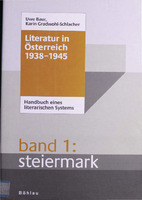Literatur in Österreich 1938-1945, Steiermark
Handbuch eines literarischen Systems. Band 1: Steiermark
Author(s)
Gradwohl-Schlacher, Karin
Baur, Uwe
Collection
Austrian Science Fund (FWF)Language
GermanAbstract
The manuscript is the first volume of an encyclopedic reference work that, as the result of basic research in literary studies, represents the first systematic attempt to provide comprehensive documentation of the literary events that took place within the official system of the Third Reich as promoted, or at least tolerated, by the decision-makers in the cultural industry more accessible, without resorting to limiting, biased attempts to define a canon. Materials will be presented for the analysis and interpretation of genesis and effects of these events and institutions. For this reason, the study is based on a functional understanding of literature and has taken key institutional elements of the literary communication system into consideration: authors and their works (including radio and film writers), scholars of German studies, the decision-makers of cultural policy (promotion/censure, literary awards), literary associations, publishing houses and theaters, anthologies and periodicals. The total control of all public creative and media activities in the year 1938 through the Third Reich dictatorship rarely provides good sources for the testing of this method. Our systematic research of the phase between 1938 and 1945 intends to create the most comprehensive description possible of the institutions within the literary system and the integration of authors. Apart from printed material in files pertaining to individuals, we primarily scrutinized the contents of the National Archive Berlin / Division on National Socialism (BDC) and what is known as the Gauakten or District Files for this purpose (the vast majority of personal information related to authors was provided by the authors themselves). The most important archival basis for the description of the institutions are files from the National Archive Koblenz (now in the National Archive Berlin) and the Municipal and Provincial Archives of Vienna.
In the survey of material, some of the events that transpired before and after the critical Nazi years were systematically included in order to draw attention to continuities and breaks. Especially significant were literary awards and honors, which illustrate the integration of writers in the various governments from the monarchy up through the Second Republic. For this reason, we have included all such prizes that are known. The first attempt to list all literary organizations in Austria and all German-language anthologies, in which Austria texts were included, covers the period between 1933 and 1945. The subsequent period has been documented not only through literary awards and honors, but also through the inclusion of the so-called "Gauakten" in the Austrian National Archive (Österreichisches Staatsarchiv / Archiv der Republik).
In order to explore the institutional factors of the literary sub-system in German-speaking regions, a new kind of handbook was created in accordance with this methodological approach, a combination of encyclopedia of persons and specialized dictionary, which should be combined in a network to form a whole. Another factor that led to this format was the division of Austria by the Nazis into seven divisions subject directly to the German government. Das Manuskript ist der erste Band eines lexikalischen Nachschlagewerks, das im Sinne literaturwissenschaftlicher Grundlagenforschung versucht, erstmals eine systematische, flächendeckende Dokumentation des literarischen Lebens Österreichs während der Ära des Nationalsozialismus (1938 - 1945) zu bieten. Es soll - vom methodischen Ansatz her - ohne einschränkenden, wertenden Rückgriff auf Kanonbildungen den Zugang zu jenem literarischen Geschehen öffnen, das dem offiziellen System des Dritten Reiches angehörte, das von den Lenkungsinstanzen des Kulturbetriebes gefördert, zumindest aber geduldet wurde und es soll der Analyse und Interpretation Materialien zu Entstehungs- und Wirkungsbedingungen zur Verfügung stellen. Daher geht die Untersuchung von einem funktionalen Literaturverständnis aus und umfasst die wesentlichen institutionalisierten Faktoren des literarischen Kommunikationssystems: AutorInnen und deren Werke (einschließlich Hörfunk und Film) sowie Germanisten, kulturpolitische Lenkungsinstanzen (Förderung/Zensur, Literaturpreise), literarische Vereinigungen, Verlag und Theater, Anthologien und Periodika. Für das Erproben eines derartigen methodischen Ansatzes bietet die Diktatur des Dritten Reiches durch die Totalerfassung der sich an die Öffentlichkeit richtenden schöpferischen und medialen Tätigkeit im Jahre 1938 selten gute quellenmäßige Voraussetzungen. Unsere systematischen Recherchen über die Phase von 1938 - 45 streben eine möglichst umfassende Beschreibung der Institutionen des literarischen Systems und der Integration der AutorInnen an. Zu diesem Zweck wurden außer Druckschriften im Bereich Personenakten vornehmlich die Bestände des Bundesarchivs Berlin/Abt. Deutsches Reich (BDC) und die sogenannten "Gauakten" durchforstet (der Großteil der Personaldaten bezieht sich auf eigene Angaben der Autoren). Wichtigste archivalische Basis für die Beschreibung der Institutionen sind Akten aus dem Bundesarchiv Koblenz (jetzt im BA in Berlin) und dem Wiener Stadt- und Landesarchiv.
Keywords
Nazionalsozialism; Austria; Literature; Authors; Institutions; Graz; Magnesium; Nationalsozialistische Deutsche Arbeiterpartei; Steiermark; WienDOI
10.26530/oapen_437159OCN
1030815973Publisher
BrillPublisher website
https://brill.com/Publication date and place
2008Grantor
Imprint
BöhlauClassification
Biography, Literature and Literary studies


 Download
Download